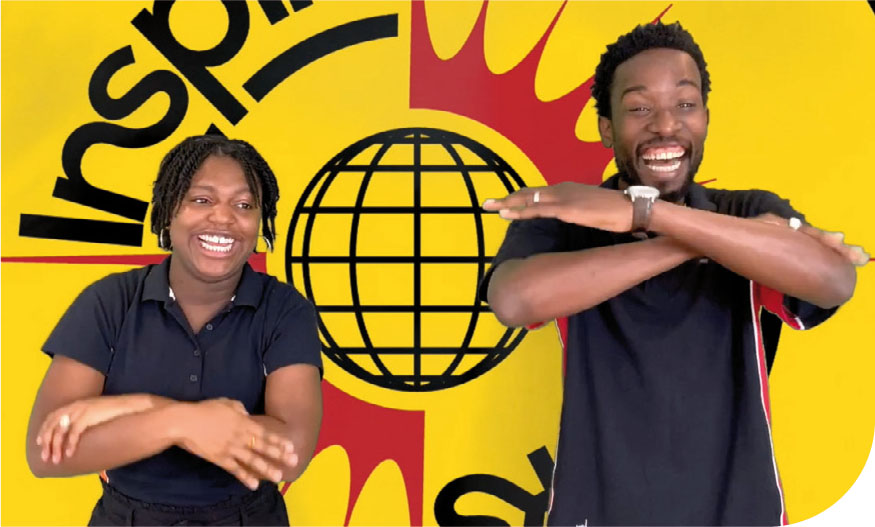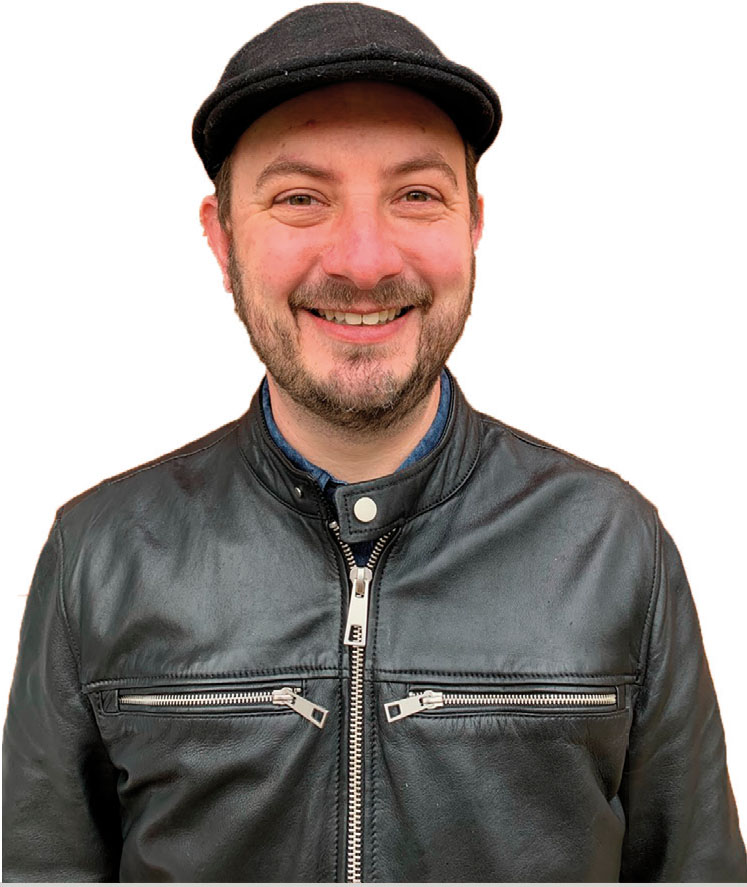
HC: For those who may not know, what is Inspire-Works?
MS: My wife and I co-founded Inspire-Works almost 18 years ago, and we have a team of workshop facilitators who each specialise in a different genre of music or dance, all focused on different areas around the globe. Pre-lockdown, we were doing face-to-face workshops in schools with about 65,000 children between us each year, and a few online. That then flipped during lockdown. We've been nominated three times for the Music & Drama Education Awards – we haven't won yet, but maybe next time… Oh, and we've got two Guinness World Records for the largest samba band and the largest drumming lesson.
HC: What is your key aim?
MS: I think our key aim is to use the arts from around the world to help workshop participants foster an understanding of a different culture. The fact that children have got someone from Senegal or Ghana teaching them West African drumming means that they're understanding a bit about the culture as well. The whole cultural side is very important for understanding the diversity of the arts.
HC: Where did your passion for this come from?
MS: We lived in Bali in Indonesia. My wife is a theatre director and a choreographer, so she was there to learn Balinese dance and shadow puppetry, and I was learning gamelan music. We spent an intensive year of study there and that's where we had the idea of setting up the business.
HC: At Expo you'll be running a session on using body percussion as part of a recovery curriculum. Why have you chosen to focus on body percussion?
MS: It's been a bit of a journey. We were always aware that when people finished one of our workshops, they felt great. We thought, ‘Is there more to it than this?’ Or is it just a nice fuzzy feeling we all get from doing something inclusive, something fun? We started doing some research and found that there were a lot of neuroscience studies specifically into what drumming or body percussion does to our brains in a positive way. The studies showed that certain rhythmic exercises can boost immune systems and reduce stress and anxiety.
We had been doing a lot of wellbeing drumming workshops anyway, both in education and corporately, but then in summer 2020 we used some of an Arts Council England grant to develop the free #BodyPercussion #RecoveryCurriculum. Government guidance said that when schools went back, children couldn't share instruments and couldn't sing, so body percussion seemed ideal. We also designed it so that all the activities could be done while seated in rows. The curriculum is essentially a series of videos led by our facilitators, as well as a support pack for teachers. Each video is an exercise or rhythmic game that focuses on one of five areas, all grounded in the neuroscience.
HC: It's interesting to hear about the neuroscience. What made you take this approach?
MS: You hear the word ‘wellbeing’ banded around a lot, but what does that mean? My dad was in a medical profession, and I've always tried to look at things from quite a medical point of view, I suppose. I think that's why it's been so popular – schools can see that this has been proven; they can point to the evidence and show it to their headteacher to explain why they need to be spending time in the classroom doing this. We've had so much feedback from schools saying how much it's benefited them – some have been doing it as a whole scheme of work in music lessons, and I know one headteacher who was starting every assembling with some of the rhythmic breathing exercises to help everyone get focused.

Still from the #BodyPercussion #Recovery Curriculum
HC: There's a lot of talk about ‘recovery’ in terms of academic ‘catch-up’. What kind of recovery are you talking about here?
MS: When we were researching what angle to take, I looked at professor Barry Carpenter, the professor of mental health in education at Oxford Brookes University. Early on last summer, he wrote about the ‘recovery curriculum’, saying some great stuff about how it would be naïve of us to think that we could just go straight back into the classroom – children would need emotional support as well. He identified five key areas, which we then linked to our five areas. That was looking at the emotional side of it, but then our #RecoveryCurriculum can be used generally in lessons as well to aid other types of ‘catch-up’, whether music, maths, geography, or something else.
HC: What would you say to those who may feel that music shouldn't just be used as a ‘wellbeing subject’ in schools?
MS: Music does have this remarkable thing that other subjects don't. I remember when I was at school doing GCSE Music, our teacher talked about the ‘tingle factor’ and got us all to bring a piece of music that gave us goose bumps. Music is an emotional experience, but there is also a very academic reason why we should be doing music. With Inspire-Works, we've always been trying to share another culture through music, but also link as much as we can to the National Curriculum. It's the same with these body percussion exercises – yes, their primary aim is to aid children with their mental health and wellbeing, but the exercises are still differentiated to suit different abilities and the teacher's pack goes into each one further.
HC: You've recently announced that Inspire-Works Studios will launch in September. Can you briefly introduce readers to this?
MS: If a child hasn't seen another country or culture, it doesn't matter how good a storyteller you are, you can't really help the child to understand it fully. So, we thought we'd see how we could use video to our advantage – in a video, we can show clips of our facilitators playing in their home country. Think about when you go somewhere new abroad and there's that trip from the airport to wherever you're staying. Your eyes are wide and you're looking around noticing everything that's different from your home culture. The idea of these docu-workshops – we think we've created a new word – is that they're giving the viewer that experience, as if they've just got off the plane. The only things we can't share are the smells, but the children are experiencing the sights and the sounds, and then they see the facilitator playing in the context of the culture, then go onto a workshop. There are also lesson plans to accompany each one, including things like composition ideas.
HC: What is Inspire-Works' position on the term ‘world music’?
MS: We have moved away from it. We've been very aware of how things have changed, even during lockdown, and the colonial connotations that come with the term ‘world music’. We are now using ‘global arts'.
HC: What do you think are the biggest barriers to teaching music from different cultures authentically?
MS: I think it's that word ‘authentically’. What exactly does that mean? It's a bit like when you go on holiday and you try the most amazing wine, but when you buy a bottle and bring it home, it tastes different. You think, why does it taste different? Then you realise it's because you're not sitting there on that balcony, in the sun, in Portugal, drinking it. We're never going to be able to fully recreate another culture – it's not just about the music. What we've always encouraged schools to do is get as much of the culture in where you can. For example, if you're doing gamelan but you're using glockenspiels, xylophones and keyboards, still tell the children to take their shoes off to play, place the instruments on the floor rather than tables, and see if you can set them up in a configuration that looks a bit like how a gamelan might be set up.
It's about trying to respect the different culture, understand it, do your own research, and not make any assumptions. Also, try not to teach it in the way that you learnt music – if we're Western classically trained musicians, we often want to picture everything written down in notation, but this doesn't work for some music. We also want to work out where the pulse is, but pulse is sometimes the last thing a musician from another culture thinks about. I think it's important to understand a bit about how the music is taught in another culture, and then see which parts of that experience can be shared with children here in the classroom.

Mike Simpson
Mike Simpson will present ‘Using body percussion for your recovery curriculum’ at 3:45pm on 24 Sep at the MDE Expo 2021. www.mdexpo.co.uk Inspire-Works Studios resources are available as one-off purchases from September. The #BodyPercussion #RecoveryCurriculum is a free downloadable resource. www.inspire-works.co.uk








